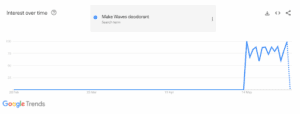The digital landscape is constantly evolving, meaning businesses are looking for new ways to stand out and attract attention in order to drive growth. In the past, digital PR and SEO tactics were often isolated, but now to be successful, they must work together and not be siloed.
Digital PR is not only a complementary tactic to SEO but also plays a vital part in amplifying the impact of search engine performance.
It is a common misconception that digital PR is solely about brand mentions. In reality, a properly executed PR strategy can successfully earn high-quality backlinks, boosting brand visibility and driving referral traffic, all key elements for SEO success.
Digital PR and SEO working together
Insight found that around half (50.9%) of digital PRs work the most closely with SEO teams, though this is higher than other teams PR collaborate with; it is a number that needs to increase for both SEO and Digital PR to see the true effectiveness of their work.
PR and SEO teams must work together not only on reporting but also to advise on priority topic areas. This can help the teams stay aligned and maximise the success if both areas are working closely to increase impact.
How PR media coverage can impact SEO

Digital PR and SEO both have the same goal in mind: gaining high-authority backlinks to boost rankings and raise brand awareness.
Google is looking for links to show that your site can be trusted and, therefore, increase your rankings. These links, however, are ranked by their authority, and the more links on high-authority sites, the better the impact – this is where digital PR comes in.
Digital PR uses storytelling to earn relevant, high-quality backlinks and work with SEO to improve rankings through media coverage. These high-quality backlinks help with SEO strategies by directly contributing to increasing domain authority, improving keyword rankings and, in turn, enhancing overall organic performance.
One of the key ways that media coverage can impact SEO is by increasing a website’s domain authority (DA). Gaining backlinks on websites with a high domain authority will boost your own site’s DA, signalling to Google that you are a credible source and, in turn, helping to improve rankings.
As the domain authority of your website increases, you are more likely to see your content ranking for target keywords. These keywords, relevant to your industry, will help Google to understand who you are and that your content is valuable. Thereby, improving your chances of ranking for these keywords in the SERPs.
Research has found that pages in position 1 on Google have an average of 3.8 times more backlinks than positions 2 to 10. Highlighting the importance of high-quality backlinks in an SEO strategy, as high-authority, relevant backlinks from digital PR campaigns strongly correlate with improved keyword rankings.
Combining both an improved domain authority and keyword rankings, you are much more likely to see a significant boost in your overall organic performance, resulting in more visibility, clicks and traffic to your website.
The importance of contextual relevance in PR and SEO
There is a huge difference between gaining backlinks and gaining relevant, high-quality backlinks. Google prioritises the relevance of a link over the quantity of links, meaning that links from reputable media sources within the target sector carry more weight than multiple backlinks from irrelevant media.
This is why a well-thought-out Digital PR strategy is imperative to see the real impact of the channel. From the start to the end of a PR strategy, there needs to be a focus on relevance to ensure that there is an SEO impact.
How PR boosts brand visibility to drive referral traffic
It is becoming increasingly difficult to differentiate digital PR and traditional PR, as the lines between the two continue to blur. Though Digital PR once focused mainly on backlinks, it is now clear there is a wider impact to be had beyond them.
Digital PR strategies now look to increase brand visibility by gaining features in relevant online publications to amplify brand exposure. This helps to improve the brand’s visibility, allowing more people to recognise the brand name and leading to an increase in credibility and trust in the brand name.
We are increasingly seeing more clients focusing on brand awareness as a key digital PR metric. Meaning that there is more focus from digital PR teams on the increase in brand mentions, with or without links, in order to get your brand name in front of your consumers and make it clear that you are an authority within the space. This adds SEO value as the brand recognition often leads to more direct brand searches, sending positive signals to Google.
Linking brand mentions are also invaluable for driving direct referral traffic to your website. The more you are featured in these relevant media sources, the more your target audience, reading the publications in which your brand is featured, is more likely to be interested in the topic and click through to your site. The traffic from this increases engagement and often leads to conversions, sending more positive signals to search engines.
Brand positioning through digital PR is essential for strengthening E-E-A-T (Experience, Expertise, Authoritiveness and Trustworthiness). A crucial framework used by Google to measure the quality of your content and its relevance in search results. Digital PR contributes to E-E-A-T through positioning your brand as an expert in the media, offering quotes from internal experts within a business to demonstrate authority in the industry.
Breaking down E-E-A-T: Experience, Expertise, Authoritiveness and Trustworthiness
The E-E-A-T framework is a must-follow for digital PR and SEO teams alike, ensuring that when your content is analysed by Google, it is seen as a high-quality and credible source. But what does this framework really mean, and how can it be implemented into a PR strategy?
- Experience: This is how you show your direct involvement in the industry you’re operating in
- Expertise: Highlights the knowledge, relevant understanding and qualifications you have on a specific subject matter
- Authoritiveness: Being recognised as a voice of authority in the space you are an expert in
- Trustworthiness: Being able to demonstrate that your brand is reliable, honest and legitimate builds credibility and trust
There are many ways E-E-A-T can be implemented within digital PR, through both reactive and proactive PR, as well as campaigns.
- Case studies are a great way to bring real people into your brand. Showing these real-life stories directly from the public offers experience as well as builds trust in your brand.
- Expert comments are the most commonly used E-E-A-T tactic, bringing together all elements of the framework by centering your expert as experienced, authoritative and trustworthy in your space.
- Product coverage and reviews are a great way to gain brand awareness and trust. Getting your products linked in relevant, high-quality publications will improve the perception of the brand and product offering.
The importance of digital PR and SEO collaboration in campaigns
Digital PR relies on the media to cover the press releases shared with them; for this, it is important to keep them interested and engaged in the content you share. Ensuring that it is not only relevant to the press and its audience but also has a point of difference from what the journalists alone can offer.
How can SEO teams contribute to digital PR campaigns?
- Keyword research helps PR teams with topic areas, keyword focus and allows campaigns to have a clearer emphasis on SEO impact
- Building optimised landing pages onsite for PR campaigns to link back to
To create a successful digital PR campaign, it is important to offer a unique insight, whether that be through data or thought leadership.
PR campaigns with strong data have been proven to succeed, with 95% of industry professionals agreeing that data-led campaigns are the most popular digital PR tactic. This data can be anything from internal brand data, surveys, or freedom of information (FOI) requests, all of which help to give the story a strong hook and increase the likelihood of it gaining traction in the press.
Thought leadership helps to strengthen E-E-A-T and positions your internal team members as experts in the industry. This is a valuable way of improving brand awareness by gaining mentions in high-quality publications relevant to your brand.
Another powerful tactic that is used to make a digital PR campaign more impactful is creative content. Offering the press unique and engaging content that they can utilise to highlight key data or to convey your story in a snapshot can increase the chances of campaigns landing in your target publications.
An average-performing digital PR campaign earns links from 42 unique domains, with 82% of links gained through digital PR campaigns being follow links, adding SEO value. This further highlights the impact digital PR campaigns can have on SEO.
Digital PR and AI search
One of the newest areas of both digital PR and SEO is the implementation of Large Language Models (LLMs) such as Chat GPT and Google Gemini.
It is now more important than ever for SEO teams to work with PR to ensure their content is easily discoverable and recommended by AI. Digital PR’s role in earning backlinks now reaches beyond search rankings to build brand awareness and credibility. The more credible a source you are, the higher the chance of your content being used in these LLMs.
In short, the more high-quality links your brand can gain through digital PR, the more you are seen as a credible source for an LLM to cite. So, for SEO teams, this means making your content as visible as possible for these models, while PR teams must continue to secure high-quality media placements, which lead to credibility and feed into these AI systems.
PR case study: Make Waves
An example of digital PR working with an SEO strategy is Embryo’s work with Make Waves.
Ongoing reactive and proactive digital PR activity over a 3-month period led to backlinks and brand mentions across national and regional press, including those on new referring domains to help close the link gap between them and their competitors. From this, we saw a significant impact in rankings, organic traffic and brand awareness.
The backlinks and brand mentions gained over this time helped Google to understand the brand relevance, helping to earn more share of voice in the SERP. The coverage led to rankings for ‘Natural antiperspirant UK’ going up from position 6.5 to 3.
When looking at Google search, we saw branded search for ‘Make Waves deodorant’ spiked following PR coverage. This demonstrates that the PR activity has contributed to brand awareness among key audiences, resulting in high intent searches.

Ahrefs showed that as referring domains for Make Waves increased, there was a steady correlation between this and organic traffic.
Over a month of securing press coverage, we saw that by building semantic relevance through PR tactics, the branded search term ‘Make Waves deodorant’ is driving +28% more traffic compared to the previous period
Want to find out how digital PR and SEO collaboration can help your business?
For any businesses looking to incorporate digital PR into their marketing strategy, it is more important than ever to consider how it can work hand in hand with SEO teams to ensure both areas are working in harmony rather than as a siloed tactic.
Digital PR could be the missing piece in your SEO strategy to increase brand awareness, improve rankings and increase domain authority, adding to your overall organic performance.
If you are looking to find out more about how digital PR and SEO can help your business succeed or want help with any other area of digital marketing, get in touch. We have a team of talented, highly experienced digital marketers ready to help you achieve your goals. Whether you need support with PPC, SEO, Digital PR or web development, we have got you covered.












